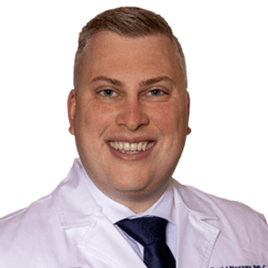 In addition to our world-class urologists and urogynecologists, we also have world-class nurse practitioners (NPs) who see patients in our various care centers.
In addition to our world-class urologists and urogynecologists, we also have world-class nurse practitioners (NPs) who see patients in our various care centers.
Patients often wonder what the difference is between doctors and nurse practitioners, so we invited one of our NPs, Daniel Nazzaro, to sit down with us and answer this question—and more.
As always, the information on our website is intended to be educational in nature, not medical advice. Discuss your specific health needs with a medical professional.
How is a nurse practitioner different from a doctor?
DANIEL NAZZARO: A nurse practitioner differs from a doctor as we are still nurses. Nurse practitioners are considered advanced practice nurses. There are several distinctions in nursing, such as midwives, nurse practitioners, nurse anesthetists, and nurse educators. All require a registered nursing license and a master's degree in their respective specialty.
What sort of training do nurse practitioners receive?
DANIEL NAZZARO: Nurse practitioners generally start out as registered nurses, and our training is expanded upon in a master's degree in nursing specifically geared toward becoming a nurse practitioner. We also have the advantage of practicing as RNs giving us clinical judgment in experience in multiple facets of medicine.
Do nurse practitioners typically specialize, like doctors do?
DANIEL NAZZARO: Nurse practitioners do specialize. Our initial certification is more general but focuses on the age demographics that they are providing care for. I myself am a family nurse practitioner, so my training was across the lifespan from pediatrics to geriatrics. Nurse practitioners can also specialize in mental health and acute care. Nurse practitioners can also receive certification in a specific medical specialty after a few years of practice in that specialty.
Can NPs prescribe medication?
DANIEL NAZZARO: Yes, we can. Nurse practitioners can diagnose, prescribe medications, and order imaging and lab work just as a physician can.
Can NPs perform surgery?
DANIEL NAZZARO: Nurse practitioners do not perform surgery. If trained by a surgeon, we can assist with surgery. For my role here at GBU, I do not assist in the operating room.
What are some of the biggest misconceptions about nurse practitioners?
DANIEL NAZZARO: I would say the biggest misconception about nurse practitioners is that we are not perceived in the provider role. I find at times I need to explain to patients that I can diagnose and write prescriptions if needed.
Now, let's talk about you specifically! Have you always wanted to pursue a career in medicine? When did you know you wanted to become an NP?
DANIEL NAZZARO: I always knew I wanted to work in medicine. My initial college degree was in medical laboratory science. I worked as a medical technologist in hospital labs, specifically in medical bacteriology. I loved and am still today grateful for my training as a med tech but wanted to pursue a career where I could focus directly on patient care. I was inspired by close friends of mine who worked as nurses. I decided to become a nurse and worked for a few years as a float nurse. Then, I continued my education to become a nurse practitioner. It is a truly rewarding profession, and it was one of the best decisions I have ever made.
Where did you go to school/where did you receive your training?
DANIEL NAZZARO: I went to Regis College for my Bachelor of Science in Nursing (BSN) and later my Master of Science in Nursing (MSN). For my training, I was lucky enough to learn from talented physicians and nurse practitioners from Faulkner Hospital, New England Baptist, Hawthorne Associates, and Veterans Affairs to name a few.
What are the types of cases/conditions that you regularly treat in your role as an NP in our Plymouth Care Center?
DANIEL NAZZARO: I treat conditions spanning all across urology. Kidney stones, BPH, UTIs, incontinence, Peyronie's disease, overactive bladder, erectile dysfunction, prostate cancer, and bladder cancer.
What are 2-3 things you love most about your work as an NP?
DANIEL NAZZARO: My favorite thing about being an NP is patient care. It is the most rewarding feeling in the world to have someone return to the office with an improvement based on the services you provided. Furthermore, I love urology because the issues that patients bring to our office tend to be personal in nature and it makes it that much more rewarding when you can fix a problem a patient has been avoiding treatment for, for years. I also love being there for the patients that we see on a chronic basis, such as our prostate cancer, bladder cancer, and neurogenic bladder patients. We play a vital role in their care, and it is an honor to be the person they turn to for help.
If there were one thing that you'd like patients to understand about NPs, what would it be?
DANIEL NAZZARO: I would like them to know that we are healthcare providers and can be as reliable for treatment as our talented physicians. Here at GBU, we work in collaboration to provide the best possible care. My job is not only to treat our patients but to also support our physicians in providing optimal outcomes.
Interested in making an appointment at Greater Boston Urology?
We have locations throughout eastern Massachusetts, including the Cape. Request an appointment with one of our medical providers.
